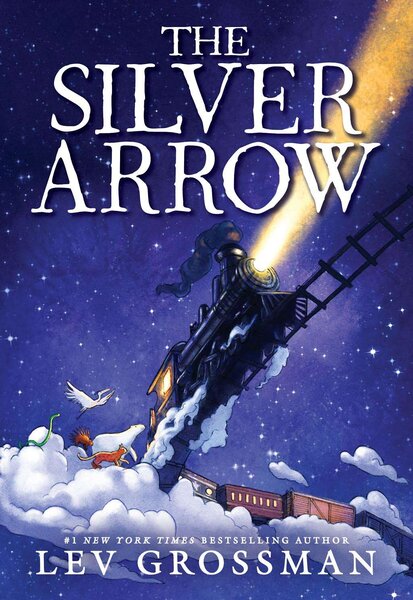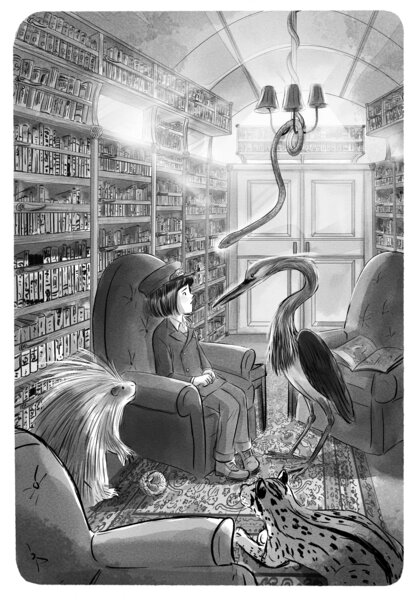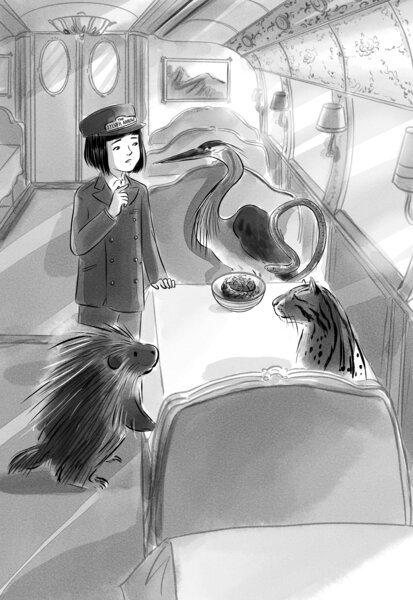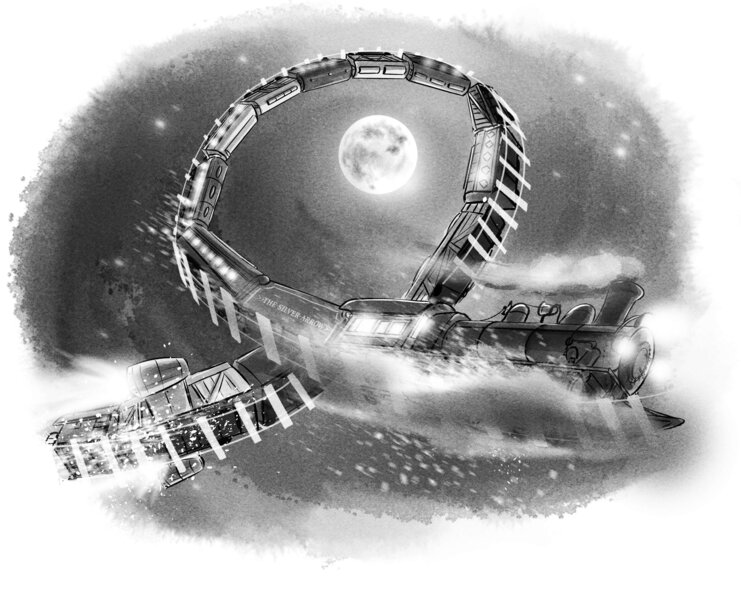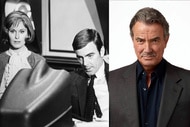Create a free profile to get unlimited access to exclusive videos, sweepstakes, and more!
The Magicians' Lev Grossman boards a magical train in new fantasy novel, The Silver Arrow
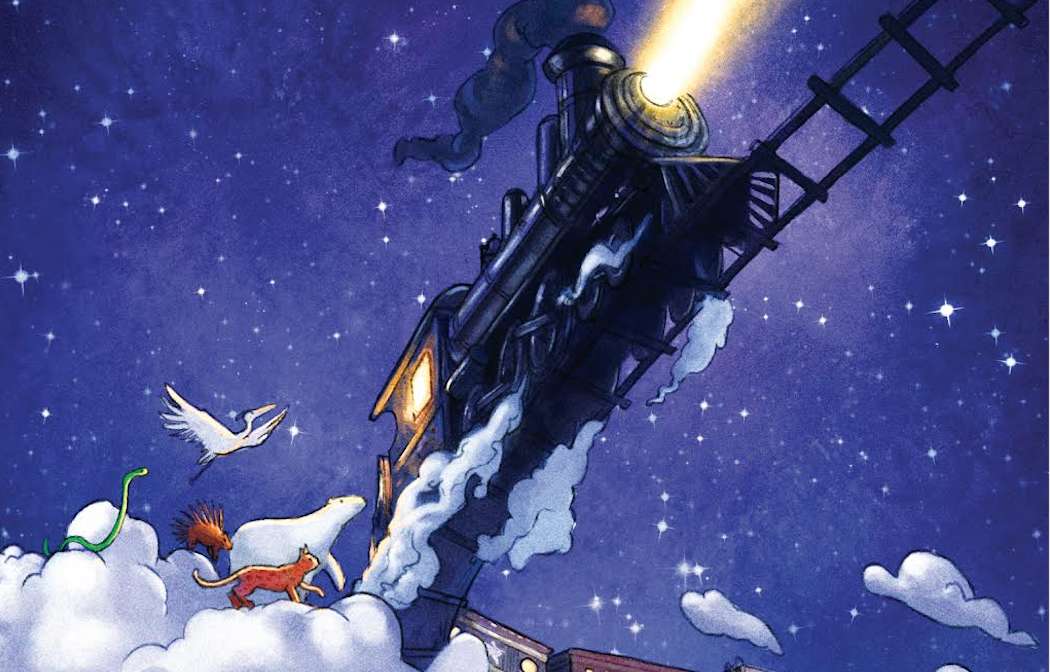
New York Times bestselling author Lev Grossman is well known for his The Magicians trilogy of fantasy novels, which was adapted into a five-season TV series on SYFY that just ended this past April. Now Grossman has turned his attention to his first-ever children’s book with the release of The Silver Arrow, which pulls into the marketplace on Sept. 1, published by Little, Brown Books For Young Readers.
This middle-grade novel, suitable for all ages, surrounds a precocious young girl named Kate who receives a full-sized steam locomotive for her 11th birthday from her eccentric Uncle Herbert. Once the enchanted train gets rolling, Kate and her younger brother Tom embark on a global adventure aboard an invisible railway serving to relocate wild animals around the world.
SYFY WIRE spoke with Grossman about how the favorite books of his youth helped inspire him, which creatures he chose for the clandestine railroad, adding environmental themes, and writing animals imbued with the power of speech.
Following the chat, enjoy an exclusive chapter excerpt from The Silver Arrow!
The Silver Arrow seems right at home in a category of timeless children's literature. What were some of your touchstones and inspirations when composing this story?
This was a good excuse to re-read all those incredible books you read as a kid that were so formative and really shaped you. They're so wonderful, so powerful, and so emotional. When I was thinking about “What stories do I want to be telling now?” I naturally thought about trying to write something in that mode. Like Roald Dahl or E.B. White. I wanted something that had that slightly classic feel. Those were books for kids but they have very grown-up emotions in them.
What tone did you hope to capture in The Silver Arrow that harken back to your favorite kids books?
There's one in particular in The Lion, The Witch, and The Wardrobe when Lucy steps through the wardrobe and into Narnia for the first time. She sees this light up ahead in the middle of this forest and she begins to walk toward it. There was this moment of stillness and magic and anticipation. And there's a moment like that in The Silver Arrow. That's one of the stars I steer by as a writer.
Another one is in James and the Giant Peach. It's that moment where James gets into the giant peach and there's a bunch of insects in there. They start hanging out and they're having a great time and it's very warm and kind of collegial in there. I love that feeling. When the animals are getting on the train in The Silver Arrow and Kate starts talking to them, that was something I think about always.
I should also mention [Hayao] Miyazaki's Spirited Away. There's a place in my book where the train is going over the ocean that's an homage to a moment in Spirited Away that I especially love.
How did you select your menagerie of animals like the fishing cat, the pangolin, and the green mamba?
It's so funny about kids and the way they read. They get really curious about animals. In my experience, it's something they just can't have too many of. Again, it's something from Roald Dahl. In James and the Giant Peach, the grasshopper talks about his ears and his knees and how weird they are. I wanted to scrape together as many of those types of facts for the book.
It was hard to pick and choose among the animals. I definitely knew I wanted a very venomous snake, a bird of some kind, and the fishing cat. I remember seeing a fishing cat for the first time at a zoo in Australia. I didn't know there were cats that swam and I was bowled over by it.
Coming out of The Magicians universe, how did you alter your style to fit younger fans?
It was definitely a shift. Children's books are really short. A Magicians novel is about 145,000 words. A middle-grade novel is about 35,000 words so I thought it would be just like a chapter. Obviously it was much harder than I expected. I'm at a point in my life when I spend a lot of time being a dad and talking to children a whole lot. So it was very natural to write something for children because I tell a lot of kids stories. I've got the voice all queued up and ready to go.
It also made me aware of how children are a tough audience. They're impatient and don't want to sit through long passages of landscape descriptions. You really need to keep the string quite taut from a plot point of view. You can't let them go. Then when you have them, their attention is so total. They get lost in books. Kids go all the way in and it's so wonderful and rewarding to write for that audience and people who read that way.
The old-fashioned spot illustrations by Tracy Bishop give the book a nostalgic feel. How did you choose that style?
It’s exactly what I was looking for. She did an amazing job and we tried out a dozen artists before we found the match.
What was the most rewarding part of completing The Silver Arrow?
It's surprising, in some way it's a more emotionally raw book than my writing for adults. I can remember reading it to my kids and I had to stop a few times because I teared up and couldn't keep reading. Especially when it came to the animals. There are some environmental themes in the book which were interesting. I didn't want it to be a book that was just saying how humans are bad and they screw up the planet. I wanted to write about animals and what their lives were like right now. And writing some of those passages, it was very emotional.
I remembered seeing a photo somewhere of a polar bear who was incredibly skinny because he was starving. It's those moments where I hope it doesn't feel like I'm making a political argument or scolding. I'm just writing about how hard it is for some of these animals.
Plus, I just like writing talking animals. [Laughs.] For some reason, I find it so much easier than writing people. When there's an animal on the page, they're not self-conscious, they just kind of do what they do. It's much easier to write a talking porcupine than a talking human.
Now climb aboard our chapter preview from The Silver Arrow by Lev Grossman:
Kate and the porcupine walked back along the swaying, rumbling, chuff-chuffing train, through the sleeper car, then the dining car, then the kitchen car, then the other kitchen car, then the other dining car. Kate was starting to get a little nervous when they finally opened the door to the library car.
All credit to Uncle Herbert: It was not a disappointment. This was the extra-tall indigo-colored car she’d seen earlier. Every square inch of its walls was crammed with books—the shelves ran all the way up to the ceiling, which must have been fifteen feet high. There were even bookshelves over the doors and windows. The floor was covered in thick red oriental rugs, and there were two overstuffed leather armchairs and a big, long, comfy couch. It even smelled like a library.
OMG, Kate thought. I am awesome at inventing train cars!
The porcupine looked around.
“It’ll do.”
He climbed up onto one of the armchairs, settled down, and closed his eyes.
“I’m mostly nocturnal,” he explained.
Then he went to sleep.
Kate walked the length of the library car, running her fingertips over the spines of the books. Each bookshelf had a wooden bar along it to keep the books from falling off when the train swayed; you could unlatch it and swing it open to get a book out. It was exactly what she’d imagined, only more so.
She skimmed a few titles. It was an incredibly random bunch of books: fat, dignified old hardcovers; big, skinny picture books; cheap paperbacks with spines so worn that you couldn’t read the titles anymore. There were guides to identifying moths in distant parts of the world, and multivolume sets of the complete letters of people with long, unpronounceable names, and romance novels with heroines spilling out of their gowns and heroes busting out of their shirts, and thrillers and horror stories with creepy one-word titles like The Trees and The Leaves, and important grown‑up novels that she mentally reminded herself to skim later for interesting and/or bad words.
And every once in a while, like a friendly face in a crowd, there were the kinds of books that Kate liked, which fell into two general categories: books about science and books about ordinary people who find out that magic is real.
Kate took down a promising-looking book from the second category and sat on the couch with it. Twenty minutes later, when the hero of the novel was just at the point of discovering that the horrible, abusive private school he’d been transferred to after the unexplained deaths of his parents had a secret school underneath it, accessible via the locker of that one kid who had mysteriously disappeared last year, something alerted her to the fact that she was being watched.
It was the cat—the one she’d met before, who was neither a big cat nor a small cat. She must have come in without Kate hearing. Her head had dramatic black stripes, almost like a badger’s. Kate really wanted to know what kind of cat she was.
“Sorry,” Kate said. “I didn’t see you there.”
“I saw you there,” the cat said.
“For a second I thought you were a pillow.”
“For a second I thought you were a large, defenseless rodent.”
Kate wondered if she should be a little worried. She was definitely bigger than the cat, but she wouldn’t have wanted to get into a fight with her.
“I guess I was really caught up in this book I’m reading,” Kate said carefully.
“It must be very good.”
“It’s all right. There’s a lot of description. I’ve been skimming a little. Have you read it?”
“No,” the cat said. “I’m not here for the books.”
“Oh. Why are you here?”
“To be alone. We’re not social animals.”
Kate wondered if that was a hint that she should leave. But she was here first. And it was her train. She tried to keep things going instead.
“What kind of cat are you? If you don’t mind my asking.”
“I don’t mind. I’m a fishing cat.”
“Sorry, but does that mean you’re a cat who likes to fish? Or is there an actual kind of cat called a fishing cat?”
“The second one.” She began licking a large paw. “I’m not surprised you haven’t heard of us. There aren’t many of us, and we don’t get as much attention as the big cats. We’re related to the rusty-spotted cats and the flat-headed cats—unfortunate name that, although it’s true, they have very flat heads. And they eat fruit, if you can believe it. A cat that eats fruit! Also the leopard cats.”
“Oh. Are leopard cats the same as leopards?”
“No.”
There was another lull. Kate tried to think of something more to say. It was hard to tell what the cat was thinking. Though she guessed that was true of every cat ever.
“So—what’s it like being a fishing cat?”
“Oh, you know. We live in swamps and mangrove forests. We hunt. We swim. And we fish, obviously.”
“Wait, you swim? Like, in water?”
“Absolutely!” It was the first topic the fishing cat sounded really enthusiastic about. “We love it. Other cats think it’s weird, but we don’t care. I mean, it’s not like we eat fruit!”
“I can’t believe you swim!”
“Well, I don’t like to boast about it. Tigers do it, too. But fishing cats probably do it the most. We have waterproof fur. And look.” She held up a paw. “Our toes are even a little bit webbed.”
“That is so amazing!”
The cat seemed pleased.
“You said something before, about what happened last time,” Kate said. “With the train. What did you mean?”
“Oh, I thought they would’ve told you about that,” the cat said. “As part of your training.”
“But that’s the thing, I didn’t get trained! At all!”
Maybe she shouldn’t have admitted that, but it just came out.
“Is that right? How extraordinary.” The fishing cat flopped her heavy tail from side to side like a velvet rope. “Well, it was before my time—we live only ten or fifteen years, you know. But I do know that before this train there was another one, and it left one day and never came back. I don’t know what happened to it, but I doubt it was anything good.”
